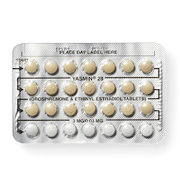Yes, it’s okay to switch what time of day you take your pills but depending on the type of pill you are taking (combination or progestin-only pill) and if you are switching to a later time or an earlier time in the day, you might need a backup method of birth control after switching times. If you move the time earlier in the day (i.e. from afternoon to morning), it will be less than 24 hours between pills, so go ahead and switch the time—you don’t need a backup method for either type of pill.
If you want to switch to later in the day and you’re taking the
combination pill (the most common type of pill) (the most common type), go ahead and switch the time since the time of day you take your pills doesn’t matter for them to work as birth control (but taking them at a consistent time can help you remember to take them every day). If it’s been 48 hours or more since you took your last pill, you’ll need to use a backup birth control method if you have sex for the first seven days after restarting.
If you want to switch to later in the day and you’re taking the
progestin-only, mini-pill (other than
Slynd, you don’t need to use a backup method if the new time is less than three hours after your original time. (For example, you were taking it at 7pm and now you are going to take it at 9pm). If the new time is more than three hours after the old time, then you’ll need to treat it as a
missed pill and use a backup method, like
condoms or
internal condoms if you have sex for the first two days after switching the time.
Yes, it’s okay to switch what time of day you take your pills but depending on the type of pill you are taking (combination or progestin-only pill) and if you are switching to a later time or an earlier time in the day, you might need a backup method of birth control after switching times. If you move the time earlier in the day (i.e. from afternoon to morning), it will be less than 24 hours between pills, so go ahead and switch the time—you don’t need a backup method for either type of pill.
If you want to switch to later in the day and you’re taking the combination pill (the most common type of pill) (the most common type), go ahead and switch the time since the time of day you take your pills doesn’t matter for them to work as birth control (but taking them at a consistent time can help you remember to take them every day). If it’s been 48 hours or more since you took your last pill, you’ll need to use a backup birth control method if you have sex for the first seven days after restarting.
If you want to switch to later in the day and you’re taking the progestin-only, mini-pill (other than Slynd, you don’t need to use a backup method if the new time is less than three hours after your original time. (For example, you were taking it at 7pm and now you are going to take it at 9pm). If the new time is more than three hours after the old time, then you’ll need to treat it as a missed pill and use a backup method, like condoms or internal condoms if you have sex for the first two days after switching the time.

